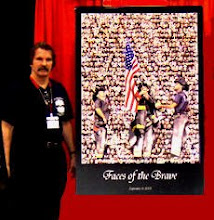Sept. 11 Memorial Rising in Bayonne
By Janet Frankston
Associated Press
BAYONNE, N.J. - At 100 feet tall, the bronze sculpture on the Bayonne waterfront is hard to miss.
The memorial evokes the World Trade Center, which once stood across the Hudson River. A jagged, vertical fissure divides the monument in two, and a 40-foot steel teardrop gently hangs in the space, like a bell.
Russian artist Zurab Tsereteli plans to dedicate his 175-ton work, To the Struggle Against World Terrorism, on the fifth anniversary of the Sept. 11 attacks. The work - past the entrance to a cruise terminal, at the tip of a peninsula near the Statue of Liberty - will be the centerpiece of a two-acre park nearing completion on a former military base.
The names of about 3,000 people killed in the 1993 World Trade Center bombing and on Sept. 11, 2001, in New York, Washington and Pennsylvania are etched in an 11-sided granite base.
Like the 72-year-old artist, known for grand statues that some critics have called more "kitsch" than art, the sculpture isn't without controversy.
The first plan had it located on the Jersey City waterfront, but Mayor Jerramiah Healy said city leaders thought the monument would impede views of the Hudson and New York.
And the Jersey City arts community's "message to the council was clear: It was not just unpleasant, but almost to the point of offensive," Healy said. "We're happy that Bayonne is happy, and we're happy that Mr. Tsereteli is happy."
Bayonne officials welcomed the sculpture, offering up a site on city-owned land planned for redevelopment.
The city is not paying for the memorial, but agreed to pay $1.25 million to create the first phase of the waterfront park, Mayor Joe Doria said.
"It's a very important memorial," he said. "We should be working against the terrorism that resulted in the attack on 9/11. The teardrop is an excellent context of what we have to do."
It is unclear how the monument is being funded, but Tsereteli called it "his gift." He said he did not want to take any money from the Russian government, but declined to elaborate.
Tsereteli's lawyer, Emily Madoff, said the materials, shipping, labor and cost to create the base was about $12 million.
The monument also has been billed as a gift from "Russian President Vladimir Putin, the people of Russia and the artist" to the people of the United States, in the spirit of France's gift of the Statue of Liberty.
The five segments of the monument arrived from Russia in September, shortly before Putin attended a groundbreaking in Bayonne while in the area for meetings at the United Nations.
The pieces were stored until May, when 17 artisans from Russia arrived to begin putting them together. Eight are still in Bayonne, welding the seams between the panels with bronze.
Next, they will sandblast the monument and seal it with a polyurethane.
Tsereteli returned to Bayonne this month to put the finishing touches on his sculpture.
"From here, if you looked at the trade towers, they looked as if they were blended as one," Tsereteli said through a translator, his 28-year-old grandson, Vasili.
He said the tear symbolized "sadness over grief that will become happiness in the future when terrorism is defeated."
There is some question about the accuracy of names on the sculpture's base. There are 3,024, according to Madoff. That's 45 more than the official count of 2,979.
New York officials removed 43 names in 2003 and 2004 from the list of the dead at the trade center, saying some people had tried to fake their deaths while others had been falsely reported missing or their deaths could not be proved to have occurred at ground zero.
Madoff said that after trying to determine the correct list from several sources, she had asked for confirmation from Kenneth Feinberg, the former special master of a federal Sept. 11 victim compensation fund. He referred her to a book published by the New York Times in 2003.
"We tried so hard to make it right," Madoff said. "If we erred, we erred on the side of inclusion."

